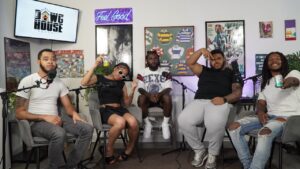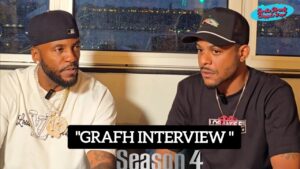In a recent episode of The Need to Know Podcast, Nyla Simone returned to the show for an engaging conversation that blended personal storytelling, candid opinions on new releases, and a major programming announcement for listeners. The episode showcased Simone’s easy rapport with the hosts, as she reflected on her connection to the show and recounted moments from her personal life, including an unexpected run-in with a childhood friend during a trip to the DMV area. Her comments reinforced her recurring presence on the platform and the familiarity she’s built with its audience.
The discussion opened with an assessment of recent projects from Gunna and Bryson Tiller. While Gunna’s latest releases were met with disappointment for their lack of evolution, the group took a more measured approach to Tiller’s work. Initially skeptical of his sonic shift, one host admitted that hearing the full album offered a greater appreciation for his willingness to experiment. This sparked a lighthearted side conversation about whether artists curate songs to subtly communicate with dates.
The episode took a more reflective turn as Simone described the backlash she faced after mispronouncing an African artist’s name during a radio segment. What began as an effort to spotlight international music led to a wave of criticism, which she compared to a similar reaction when she curated a Ghana-inspired playlist that wasn’t exclusively local. The conversation underscored the tensions that can arise when cultural appreciation is met with perceived missteps.
From there, attention shifted to JID’s latest album, God Does Like Ugly. Having heard the project early, the hosts praised its tight sequencing and deliberate pacing, noting JID’s reduced use of rapid-fire flows in favor of more digestible delivery. They highlighted standout guest appearances from Vince Staples and Malice, while also critiquing the album’s relatively quiet media rollout. In their view, a broader press strategy could better communicate the intent behind the music.
The hosts debated whether JID has the potential to reach the commercial heights once projected for Lil Baby, arguing that he possesses the skill set and respect to do so but may need to broaden his female fanbase. They cited his consistent quality over the years and pointed to the diverse musical elements on God Does Like Ugly, including Spanish-language verses and collaborations with Black and Ty Dolla $ign, as evidence of his range.
JID’s album review naturally led to a discussion about J. Cole, especially after his decision to sell part of Dreamville to Universal Music Group and share the profits with his roster. The gesture was seen as rare in the industry and emblematic of his character. The group also reignited the long-running debate over Cole’s place in hip-hop’s “big three” alongside Drake and Kendrick Lamar, and whether his profile would justify a Super Bowl halftime show slot.
Bryson Tiller’s double-disc album, The Vices, became another focal point. The hosts noted his intentional departure from his signature “trap soul” blueprint, leaning instead into “sexy drill” and grittier textures. They credited prior media interviews with helping fans accept his new direction, contrasting his approach with the “trap soul” class that includes PartyNextDoor, Brent Faiyaz, The Weeknd, and Tory Lanez.
The conversation later turned to Tyla’s EP WWP, which debuted with 3,700 first-week units. While the music itself, including the track “Is It”, received praise, the low sales figures sparked questions about the sincerity of online fan support and the realities of modern streaming-based metrics. The hosts suggested marketing bundles and critiqued her team’s strict media controls, pointing to a tense interview with Charlamagne Tha God as a missed opportunity for authentic connection.






